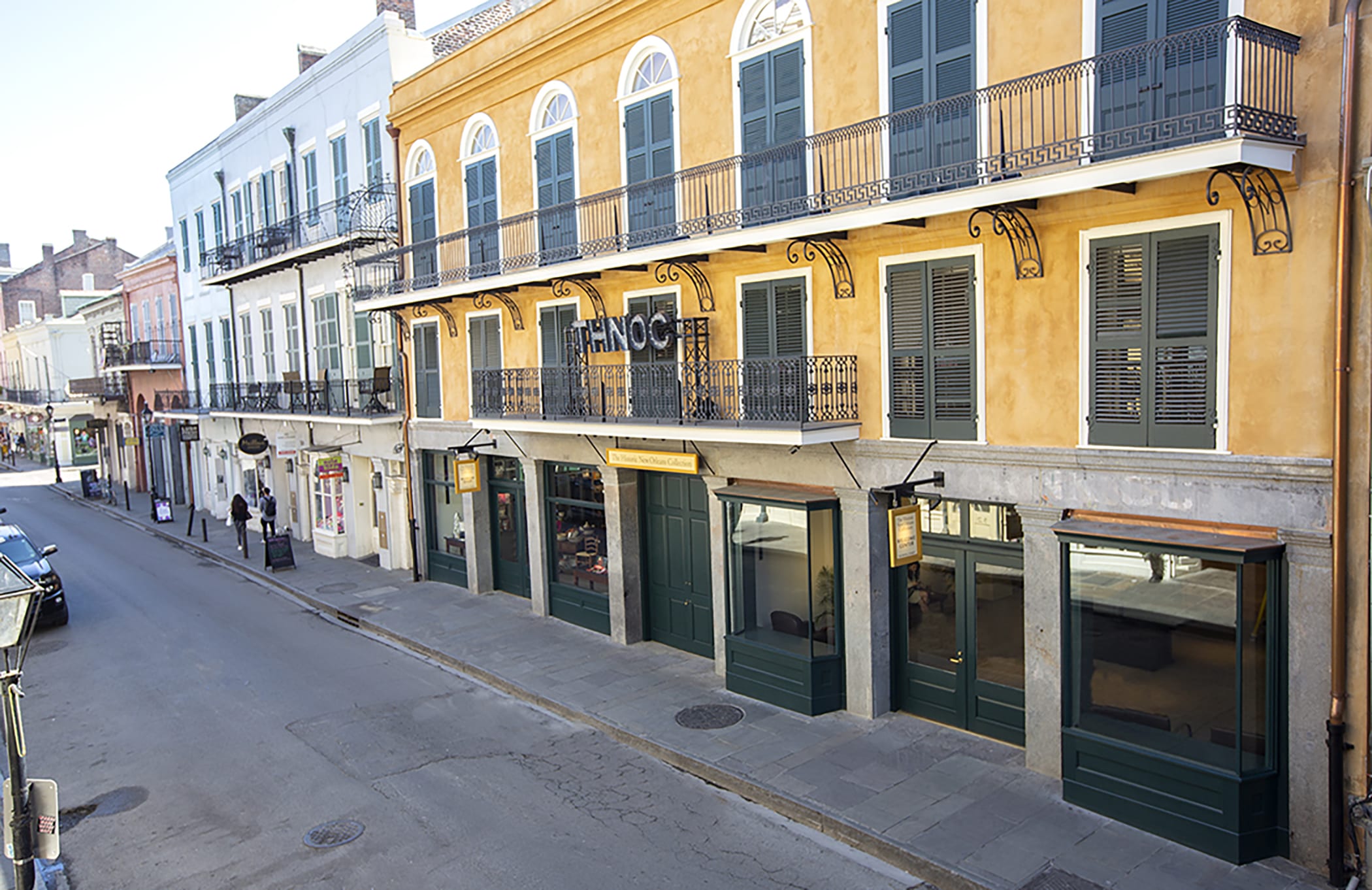The French Quarter is one of the country’s most storied historic neighborhoods, so it’s unsurprising there’s a first-class history museum, The Historic New Orleans Collection, to be found there.
Earlier this year, the HNOC opened a new exhibition center on Royal Street featuring a permanent exhibit on the history of the Quarter, from early European settlement to Cafe du Monde, as well as rotating exhibitions exploring the evolution of the 300-year-old city. It’s just one of more than a dozen buildings the HNOC now includes in the French Quarter, housing extensive collections covering everything from music, sports, Carnival, and the Civil War and Reconstruction.
View this post on Instagram
“We have an archive of over 1 million items that a lot of people don’t know about,” said Eli Haddow, marketing associate at HNOC. “This new facility first and foremost gives us the ability to tell stories with these objects that we have.”
All exhibits at the new facility, and the nearby HNOC site on Chartres Street, offer free admission, with a small fee for certain guided tours. You can also visit the HNOC website for free podcast-style audio tours and app-based guides.
There’s also a new casual restaurant called Café Cour, offering tasty and reasonably priced food, coffee and other beverages from the owners of Carmo, the tropical-themed restaurant in the Warehouse District. Have your lunch or morning coffee in the museum’s outdoor, European-style courtyard to take advantage of the free Wi-Fi and fresh air.
View this post on Instagram
Inside the building, one of the new center’s first exhibitions was “Art of the City: Post-Modern to Post-Katrina,” which explored roughly 35 years of New Orleans art, beginning with the 1984 World’s Fair era. A current exhibit highlights recently rediscovered drawings by Gaston de Pontalba, son of Micaëla Almonester, Baroness de Pontalba, namesake of the Pontalba buildings along Jackson Square. The sketches, on loan from the Pontalba family, capture the city and surrounding areas from 1848 to 1851.
“They’re so detailed and they give you such a good sense of what the city looked like at the time,” said Haddow.
Another exhibit, in the Chartres Street facility, focuses on photographs of scenes from Matsue, Japan, by photographer Edward Kennedy Brown. That might seem an odd choice for a New Orleans history museum, but the photographs highlight the experiences of Lafcadio Hearn, the journalist who spent a decade, from 1877 to 1887, writing influential tales of life in New Orleans for the Item and Times-Democrat. He ultimately settled in Matsue, now an official sister city to New Orleans, and became internationally known for his collections of Japanese folktales and legends. The photographs in the exhibit, titled “Seeking an Open Life: Photographs of Lafcadio Hearn’s Japan,” portray Matsue using the printing technique characteristic of Hearn’s era.
An upcoming exhibit, titled “Crescent City Sport: Stories of Courage and Change,” opens Friday and will highlight the role of sports in the city’s history, from the black baseball team once owned by Louis Armstrong to the evolution of the Saints and the Sugar Bowl.
View this post on Instagram
“A lot of people don’t know that we have the archive of the Sugar Bowl, which was started back in the 1930s,” Haddow said.
The HNOC traces its origins back to the 1960s and the collection established by its late founders Gen. Lewis Kemper Wiliams, a World War I and II veteran who went on to become a businessman and philanthropist, and his wife, Leila Williams. Their historic home on Toulouse Street, once home to elegant dinner parties, is also open for regular guided tours.
Once you’ve had your fill of the historic artifacts and exhibits, check out the HNOC gift shop for a wide assortment of New Orleans knickknacks, collectibles and clothes. There’s also a great assembly of locally themed books, including many published by the HNOC itself, from a biography of New Orleans R&B great Ernie K-Doe to a collection of “Blue Books,” contemporary guides to the offerings of New Orleans’ decriminalized brothels of the early 20th century.
And on Dec. 1, the new exhibition center will host a group of 10 local artists presenting their own creations to holiday shoppers, along with refreshments from Café Cour and the French Quarter bar and restaurant SoBou.







